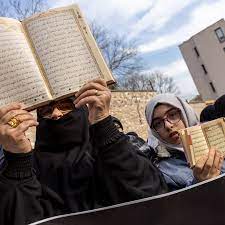


The recent incident of burning a copy of the Holy Quran in Sweden has led to wider questions, whether such an act could be described as Hate Crime or not and what are the limits of Freedom of Expression, apart from why the culprit a Muslim committed such an act?
Salwan Momika, 37, an Iraqi national living in Sweden for the last two years,
burned pages of the Holy Quran outside a Stockholm mosque on Wednesday 27th June, after placing a piece of bacon, considered impure by Muslims, and stomping on it.
Apparently he had posted a video online earlier, declaring his intention to burn the Holy Quran on the day of Eid-al Adha festival, and had even asked for donations and support from his family and friends in the video. Further justifying his act he said that he had received permission from the Stockholm Police to burn a copy of the Holy Quran and as reported by Al Arabiya, he intended to burn another copy of the Holy Quran within 10 days.
After being granted a permit to protest by Swedish police, Salwan stomped on the Islamic holy book and set several pages alight in front of the capital’s largest mosque.
Obviously, the act sparked anger across and beyond the Middle East. On its part the United States condemned the incident but added that issuing the permit for the demonstration supported freedom of expression but it was not an endorsement of the action, thus tacitly supporting the Swedish authorities.
Meanwhile, NATO Secretary General Jens Stoltenberg has stated that the incident was offensive and objectionable, but not illegal. The NATO chief, however, pushed for a deal on Sweden’s NATO membership despite the event, adding another dimension to the incident.
Turkey condemned Swedish authorities’ decision to approve the Quran-burning demonstration, a move that may risk Sweden’s bid to join NATO before the bloc’s key summit in July. Turkey’s foreign minister has termed the protest a “heinous act.”
Meanwhile, in its defence the Swedish Police said though it had granted Salwan a permit in line with free-speech protections, but now it has opened an investigation over “agitation against an ethnic group,” noting that he had performed the burning so close to the mosque.
The police authorisation for the protest came two weeks after a Swedish appeals court rejected the police’s decision to deny permits for two demonstrations in Stockholm, which were to include Quran burnings.
Police had at the time cited security concerns, following a burning of the Muslim holy book outside Turkey’s embassy in January which led to weeks of protests, calls for a boycott of Swedish goods and further stalled Sweden’s NATO membership bid – which is being blocked by Ankara.
The appeals court however in mid-June ruled that police were wrong to ban such demonstrations, saying the security concerns cited by the police were not sufficient to ban the events.
Apparently Sweden rarely condemns protests and public opinion. And, reportedly, a court there gave permission for Salwan’s demonstration on Wednesday. Though the police claim that it refused to authorise the Quran burnings in Stockholm.
On his part, Salwan says his idea was to highlight the importance of freedom of speech as he was quoted in reports as saying, “This is democracy. It is in danger if they tell us we can’t do this.”
However, a more important question here emerges whether this act can be construed as an act of Hate Crime or not? In absence of any universally agreed definition of Hate Crime and Hate Speech, there are opinions on both side of the spectrum debating whether or not this act qualifies as a Hate Crime or not.
Salwan, speaking to Swedish newspaper Expressen, denied that his actions constituted a “hate crime” or “agitation towards any group.” “The police have the right to investigate whether the burning is a hate crime. They could be right and they can be wrong,” he told the newspaper, adding that it would be up to a court to decide in the end.
Thus, the whole episode leads us to the basic question whether the act was Hate Crime or not. In absence of any universally accepted definition of Hate Crime, and the manner in which crimes against the Muslim community in Europe and elsewhere are not dubbed Hate Crime, there is an urgent need to give a universally accepted definition of a Hate Crime.
Just like condemning Xenophobia in any form or shape, the western world needs to act unitedly against acts or words against the Islamic community. Otherwise the chasm between the western and the eastern world may increase further, and the so-called Islamic countries will continue to express only a muted response to such incidents, keeping their financial interests and ties with west, in mind.
At its level the UN had proclaimed 18 June as the International Day for Countering Hate Speech, building on the UN Strategy and Plan of Action on Hate Speech launched on 18 June 2019. But as articulated by the UN Secretary-General António Guterres, at the launch on 18 June, “But we are far from powerless in the face of hate speech. We can and must raise awareness about its dangers, and work to prevent and end it in all its forms.” We, by which, I mean the western nations first and other nations too, must act swiftly to put in place a universally accepted definition of Hate Crimes, encompassing all forms of Hate Speech and other acts inimical to the Muslim community, additionally also deciding what are the limits to Freedom of Expression, otherwise incidents like the Sweden one will continue to happen, agonising a vast global populace.